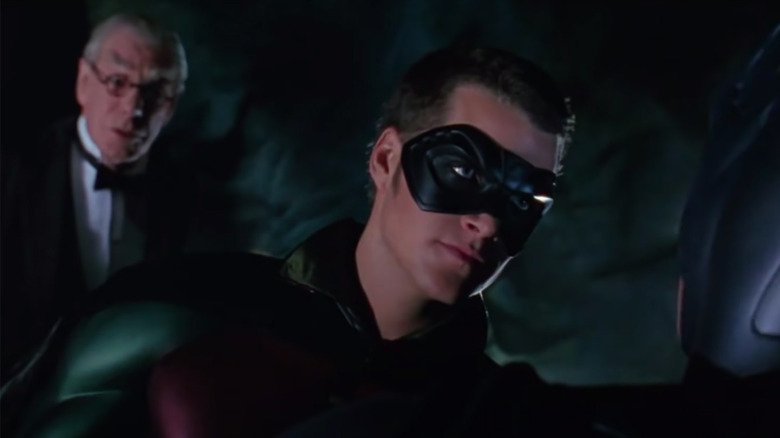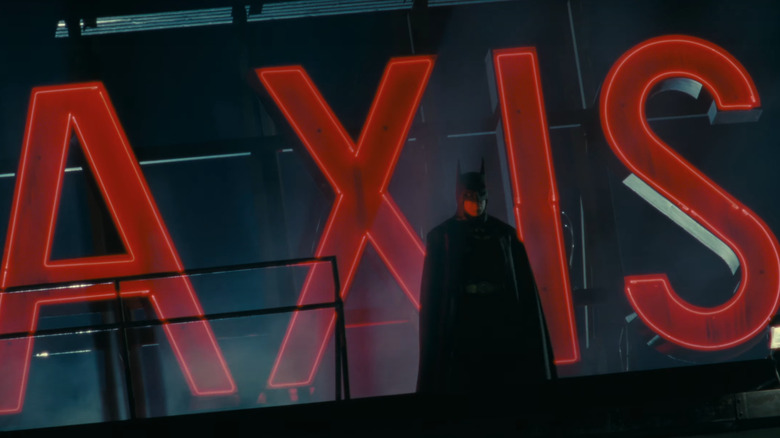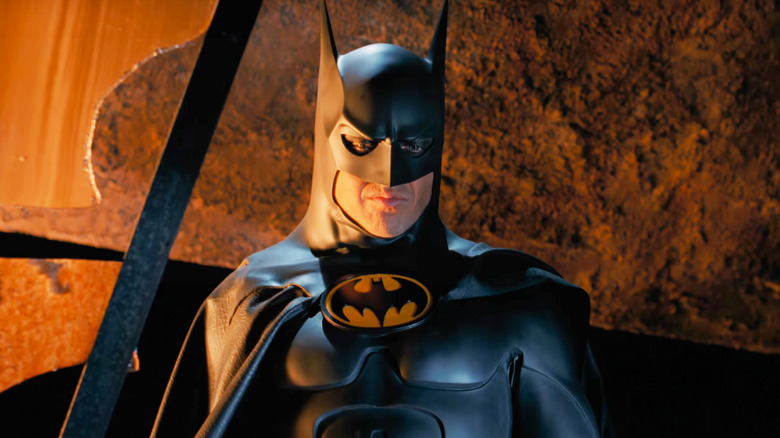Robin Was Originally Set To Appear In Tim Burton's Batman And Batman Returns
There's a whole alternate history to Tim Burton's Batman run that would have profoundly changed the course of the Dark Knight's cinematic legacy. In another universe, the director would have gone on to direct a third movie in the franchise following 1992's "Batman Returns". In place of Joel Schumacher's "Batman Forever," we could have had Burton's "Batman Continues" (yes, that's really what it was going to be called), which would have tied up a lot of the threads left over from the first two movies.
Alas, as Burton famously said after pitching the whole idea to Warner Bros. Pictures, "You guys don't want me to make another one, do you?" And they didn't. Thus, the Burton era of Batman ended with "Batman Returns" — still the best Batman movie ever made, in the opinion of this writer. Even after Burton was out, Michael Keaton wanted to do an origin story for the Caped Crusader. On Marc Maron's "WTF" podcast, the star of the first two Burton films recalled telling the studio, "You wanna see how this guy started ... this could be brilliant." Again, the studio wasn't biting.
If it didn't necessitate removing what I believe is the excellent "Batman Forever" from the canon, I honestly wish we'd gotten a chance to see where Burton and Keaton would have taken the character post-"Batman Returns." But it's not just the third Batman movie that would have been different in our multiversal hypothetical. In these alternate timelines, there are also totally different versions of 1989's "Batman" and "Batman Returns," in which Keaton's brooding loner would have been joined by the Boy Wonder himself. Though our main universe timeline remains without Robin in these early Batman movies, we actually got pretty close to seeing the character crop up in Burton's Gotham.
Robin's unmade intro sequence from Batman '89
If the idea of Robin in the gothic nightmare-scape of a Burton Batman film seems incongruous, you won't be surprised to learn that it was Warner Bros. that wanted the sidekick included and not the director. As screenwriter Sam Hamm explained in an interview with 13th Dimension, "The studio was insistent ... Tim and I realized we had better try to accommodate them." The pair initially decided they couldn't fit Robin into their story, and they were about to tell the studio as much before they "started spitballing again." That's when they came up with what Hamm called "a really cool Robin sequence."
The pair got as far as scripting and even storyboarding the entire intro section for the character (which can be seen in semi-animated form here, complete with voiceover from legendary Batman and Joker voice artists Kevin Conroy and Mark Hamill). It would have seen Jack Nicholson's Joker being pursued by Batman on horseback, before driving through a performance by the Flying Graysons acrobat team. Joker then ignites a whole van full of fireworks, which erratically disperse, killing Dick Grayson's parents in a truly capricious act that, whichever way you look at it, clearly betrays its rushed conception.
After going to all this trouble to shoehorn in a character they didn't even want to include, Burton and Hamm must have been at once relieved and nonplussed to see the whole sequence cut during production. As Hamm recalls it, "Production is underway, and the picture is running over budget, what does the studio decide to cut? You guessed it – Robin! And in the end, nobody missed him." Despite Burton referring to his "1989" effort as a "lighthearted romp," it seems obvious that this was one romp that was better off without Robin.
Batman (and almost Robin) Returns
They might not have missed Robin after he was cut from the 1989 movie, but that didn't mean Burton's franchise run was entirely free from the cloying shadow of the Boy Wonder. Once "Batman" had proven hugely popular, raking in $411 million at the global box office, Warner Bros. was naturally keen to get a sequel underway. Burton would once again direct, this time aided by screenwriter Daniel Waters, who penned 1992's "Batman Returns" with a decidedly darker tone than the already fairly grim, retrofuturist 1989 movie.
Who did Warner Bros. envision as a crucial element in the doom-laden gothic environs of Burton's follow-up? Marlon Wayans, of course. Yes, the studio had greenlit Wayans to play Robin in the movie, even paying him $100,000 ahead of filming. Unfortunately, for the then up-and-coming actor, he was removed from the film fairly early on. According to Wayans, the reasoning had to do with the film already being crowded with too many characters, but I'm not so sure Burton was all that keen on having the character of Robin in his dark, verging on grotesque, vision of Gotham anyway. Whatever the case, Sam Hamm would bring a Wayans-based Robin to fruition almost 30 years after "Returns" with the launch of the "Batman '89" comic book.
Holy tonal mismatch, Batman!
Once "Batman Forever" arrived in 1995, Robin would finally get his on-screen debut — alongside Val Kilmer's bat-nipples. Wayans would be nowhere in sight, however, with Chris O'Donnell taking on the role and reprising it in 1997's "Batman & Robin." I know a lot of bat-fans think Robin is a crucial member of the unfortunately-titled "Bat-family," but (and I'm just saying) once they put his name in the title, things really didn't go too well. "Batman & Robin" is, to date, the only film George Clooney has publicly denounced, and while it isn't the most offensive thing to ever hit a screen, it's a far cry from the truly revolutionary Burton era.
It seems Burton and Hamm knew Robin wasn't going to work within the confines of their darker projects. As the director recalled, "I think almost everybody across the board was happy with no Robin. I can't recall one person that's going 'we gotta have Robin in this." The character got the debut he deserved in the comparatively light-hearted "Batman Forever," in which he works so much better fighting against Tommy Lee Jones' wild Two-Face than he ever would opposite Danny Devito's bile-spewing Penguin in "Returns" or the smoldering corpses left in the Joker's wake in "Batman."
Personally, I can do without Robin generally, though I don't mind O'Donnell in "Forever." It just works better for me without Robin, and we should all be so grateful those first two Burton movies dispensed with the character.



